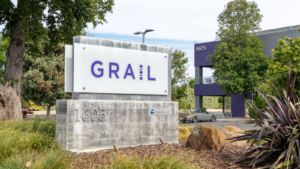Many new types of cancer treatments are being developed, including personalized cancer vaccines, and precision oncology treatments. But very few treatments have the potential to be the next Keytruda.
In this column on cancer treatment stocks, I will identify two companies with drugs that I think could fit the bill. I will also profile a company that has developed a blood test which successfully detects many types of the disease in the early stages. By doing so, it can save millions of lives.
Grail (GRAL)

Grail’s (NASDAQ:GRAL) Galleri blood test can determine whether individuals have over 50 types of cancer. Moreover, the diagnostic can show, with nearly 90% accuracy, where the cancer is located. And according to Grail, the test has a very low false positive rate of just 0.5%.
The test can save millions of lives by identifying asymptomatic cancer cases before they become impossible to treat. For example, by the time people with pancreatic cancer show symptoms, it’s generally after their cancer has spread beyond the initial tumor. Consequently, the vast majority of people with the disease die from it. But if pancreatic cancer is discovered while it’s still localized to the pancreas, the five year survival rate is 44%, compared to just 3% for patients diagnosed in the latest stages of disease.
Although the vast majority of insurers have not yet been willing to cover Grail’s test, I believe that they will ultimately do so. That’s because, given the fact that cancer costs the U.S. $200 billion annually, there’s a large economic incentive to lower that figure. That’s particularly true for private insurers, governments, and hospitals that bear the lion’s share of those costs. Moreover, once word spreads among the public of the fact that their lives can easily be saved by Grail’s test, political pressure to cover its diagnostic tool should mount.
ImmunityBio (IBRX)

Experts estimate that ImmunityBio’s (NASDAQ:IBRX) Anktiva biologic, which has been approved as a treatment for nonmuscle invasive bladder cancer, can generate $878 million as a treatment for that indication in 2028. Also positively, on June 20, the company reported that multiple insurers had agreed to cover the drug for these patients.
Additionally on April 25, the company disclosed that, in a Phase 3 trial, non-small cell lung cancer (NSCLC) patients who took the drug had “median overall survival almost double that of standard of care chemotherapy.” The company noted that it had scheduled a meeting with the Food and Drug Administration to discuss submitting an application for the approval of the drug as a treatment for “2nd– and 3rd-line NSCLC patients whose cancer previously did not respond to checkpoint therapy.”
ImmunityBio believes that 80%-85% of the over 238,000 of estimated lung cancer cases in the U.S. were in the NSCLC category. Hypothetically, if 50% of lung cancer patients are treated with Anktiva and the company charges the same $216,000 per patient (six doses at $36,000 per dose) that it’s seeking for bladder cancer patients, that would work out to $25.7 billion of annual revenue for the company from the NSCLC category alone.
Moreover, ImmnityBio has reported that Anktiva shows promise for treating pancreatic cancer as well.
Given the huge potential of Anktiva, I view ImmunityBio as one of the best cancer treatment stocks to buy.
GSK (GSK)

GSK’s (NYSE:GSK) Jemperli treatment continues to make progress towards becoming a very lucrative, highly successful treatment for multiple types of cancer.
On July 1, the European Medicines Agency, the EU’s version of the FDA, agreed to evaluate an application by GSK to allow the drug to be used to “treat all adult patients with primary advanced or recurrent endometrial cancer.” The company expects its application to be approved in the first half of 2025.
The drug was previously approved by the EMA to treat only some patients with advanced or recurrent endometrial cancer. About 417,000 cases of new endometrial cancer are reported annually on a global basis. And approximately 121,000 people are estimated to be “diagnosed with primary advanced or recurrent endometrial cancer yearly in Europe,” BioPharmInternational.com reported.
Similarly, in April the FDA agreed to consider approving Jemperli for use by the same group of patients in the U.S. The agency is expected to make a decision on the application next month. As is the case in the EU, Jemperli is only currently approved for some patients with primary advanced or recurrent endometrial cancer. An estimated total of nearly 68,000 cases of endometrial cancer will be diagnosed in the U.S. this year, according to the American Cancer Society.
Meanwhile, in June GSK reported that a Phase 2 study of Jemperli as a treatment for rectal cancer continues to show that the 42 patients who took the drug were basically completely cured. In more technical terms, an unprecedent 100% of patients had a “complete pathologic response or no evidence of tumors” as assessed by a number of tests. Nearly one-third of patients who receive standard-of-care treatment for rectal cancer die from the disease , according to GSK. What’s more, the standard of care, unlike Jemperli, often causes severe, long-term side effects.
On the date of publication, Larry Ramer held long positions in GRAL and IBRX. The opinions expressed in this article are those of the writer, subject to the InvestorPlace.com Publishing Guidelines.
On the date of publication, the responsible editor did not have (either directly or indirectly) any positions in the securities mentioned in this article.
Larry Ramer has conducted research and written articles on U.S. stocks for 15 years. He has been employed by The Fly and Israel’s largest business newspaper, Globes. Larry began writing columns for InvestorPlace in 2015. Among his highly successful, contrarian picks have been SMCI, INTC, and MGM. You can reach him on Stocktwits at @larryramer.
